Hong Kong Apostasy
‘Sons and daughters of Hong Kong,
Let us March together for what is right!
This is the Revolution of Our Times! …’
同行兒女,為正義,時代革命⋯⋯
In streets shrouded in tear gas; in bustling malls throughout the territory; at sweat-soaked sports fields — no matter where you have been or what time of day or night it is, for the last two weeks these lines from ‘Bring Back the Glory of Hong Kong’ have echoed through crowds everywhere in our city, and they have touched us deeply.
Both the words and the melody of ‘Bring Back the Glory’ resonate profoundly with the Hong Kong Spirit of Resistance. Some people are already hailing the song as a ‘national anthem’; others celebrate it as a worthy martial ballad. But the creators of ‘Bring Back the Glory’ prefer to call it a marching song.
Their aim in composing this song was to write something that would lift the spirits of the People of Hong Kong who have all been fighting for democracy and freedom at a time of ever-increasing darkness. They don’t want to bask in the glory of having produced such a song, nor do they fear reprisals from the authorities.
‘If you have to worry about being punished for singing a song that gives voice to the beliefs of masses of people, it only goes to show that the government itself is in deep trouble.’
Despite this bravado, the main writer hastens to add:
‘Actually, I’m far more scared of Apple Daily taking my photograph.’
「同行兒女,為正義,時代革命⋯⋯」滿佈硝煙的街頭、熙來攘往的商場、揮灑汗水的大球場,不論何時何地,過去兩個星期,有一首《願榮光歸香港》,總有那麼兩句歌詞,穿透人海直達心坎之中。旋律歌詞與抗爭初心共鳴,有人說它是國歌,有人說它是軍歌,創作團隊僅稱它是進行曲,旨在於最黑暗的時間,為每位捍衞民主自由的港人打氣,不願爭奪光環,亦絲毫不畏極權的秋後算賬,「唱一首帶有民眾信念嘅歌都要驚算賬,好明顯係個政府有問題。」語畢,偏又要補一句:
「比較驚《蘋果》影相。」
— from She Kam Hung 佘錦洪,
‘The Man Who Created the “Hong Kong National Anthem” —
“Bring Back the Glory: An Anthem for Hong Kong” —
Declares That He is Not Afraid of Retribution:
Do You Have to Worry About What You Sing?’
「國歌」響徹全港 《願榮光歸香港》
創作人無懼遭清算:唱歌都要驚,
Apple Daily, 12 September 2019***
In this chapter of ‘Hong Kong Apostasy’ we feature an interview with the man behind the song ‘Bring Back the Glory of Hong Kong’ 願榮光歸香港, which we first mentioned in ‘For We are Like Olives’ (China Heritage, 6 September 2019).
‘Bring Back the Glory’ features a number of terms and metaphors that have deep historical resonances. The darkness of night that swallows the very stars, as well as the promise of a new dawn, are images found in the poetry and songs of many cultures at times when a struggle is being joined against forces of repression and the resistance lives in hope of a better future.
In ‘Bring Back the Glory’ the lyricist also evokes a particularly resonant expression from China’s May Fourth era (1917-1927): 吶喊 — pronounced naa3 haam3 in Cantonese and nà hǎn in Standard Chinese — which is usually translated as ‘a call to arms’. It is a widely known and used expression because it was the title of the 1922 collection of stories by Lu Xun, a champion of freedom, independent thought and resistance to all forms of repressive conservatism in the Chinese tradition. The expression 吶喊 ‘call to arms’ has been resonant since the time of Lu Xun. In ‘Hong Kong Apostasy’ we have noted that it featured in an eloquent denunciation of the Hong Kong authorities by a group of concerned citizens (see ‘For We are Like Olives’, 6 September 2019), and, previously, it was in prominent display during the 1989 Beijing Protest Movement. The Chinese characters 吶喊 nà hǎn were literally writ large in Tiananmen when they appeared on a banner during the May 1989 student hunger strike. The words symbolised both a plea to the government to respond to the students’ demands and an appeal to the people of Beijing to join the protests. That ‘call to arms’ helped galvanise the Chinese capital.
Songs and music were also a feature of the 1989 Beijing protest movement, just as they have been in previous Hong Kong protests. In the case of Beijing, a few songs like ‘Nothing to My Name’ 一無所有 by the rock ‘n roll singer Cui Jian 崔健 were sung by the protesters who knew his work, however, during the mass ‘choral competitions’ 對唱 that took place when students faced down martial law troops prior to the 3-4 June massacre, the lacklustre musical repertoire that was shared by both sides of the conflict featured works steeped in patriotic hyperbole and Communist Party militance.
On the eve of mass murder in Beijing’s streets, the popular Taiwan songwriter Hou Dejian 侯德健 wrote an affecting, although rather tepid, song for the students which he called ‘The Beautiful Chinese’ 漂亮的中國人. Hou had come to fame ten years earlier in Taiwan with ‘Heirs of the Dragon’ 龍的傳人, a song written in a mood of patriotic fury following the announcement by the United States government that it was recognising the People’s Republic as the sole legitimate government of China.
Although the expression ‘heirs of the dragon’ is used by Mainland propagandists and Patrio-Nasties alike as shorthand affirmation of a unique Chineseness, Hou’s original intention was pointedly anti-authoritarian. After all, the song goes, ‘Under the claws of this might dragon I grew up/ And its heir I have become./ Like it or not — /Once and forever, and heir of the dragon.’ In its own way, Hou’s song was also a ‘call to arms’ 吶喊 nà hǎn, or rather a ‘cry of anguish’:
It was a hundred years ago on a quiet night,
The deep dark night before the great changes,
A quite night shattered by gunfire,
Enemies on all sides, the sword of the dictator.
For how many years did those gunshots resound?
So many years and so many years more.
Might dragon, open your eyes
For now and evermore, open your eyes.— trans. Linda Jaivin in Barmé and Jaivin, eds,
New Ghosts, Old Dreams: Chinese Rebel Voices
New York, 1992, p.154Hou’s ballad became popular first on Taiwan and then in Hong Kong, it also made the singer famous on the Mainland, and he defected to Beijing in 1983. For some listeners, however, the song was a chilling reminder of a darker history. As Bo Yang 柏楊, a famous Taiwan-based political dissident, historian and essayist commented:
I really don’t know why the Chinese people have chosen the grim, hideous figure of the dragon to symbolize our nation! In fact, the dragon can symbolize only the hardships of our people! Whenever anyone mentions ‘The Heirs of the Dragon’, my hair stands on end.
— New Ghosts, Old Dreams, p.155
Forty years since ‘The Heirs of the Dragon’ was first sung in Taipei and thirty years after ‘The Beautiful Chinese’ was heard in Tiananmen Square, from late August 2019 and in the wake of three months of tireless anti-government demonstrations, the protesters of Hong Kong not only had a theme song worthy of their uprising, they also have a stirring anthem for the city they were defending.
Below we offer our version of ‘Bring Back the Glory of Hong Kong’ followed by a translation of an interview with the musician behind its composition. We end this chapter of ‘Hong Kong Apostasy’ with a word of caution from a protester. He advises his comrades that the long-term struggle in which they are engaged requires more than just a rousing song.
— Geremie R. Barmé
Editor, China Heritage
12 September 2019***
Recommended Rendition of ‘Bring Back the Glory of Hong Kong’:
- 《願榮光歸香港》, 管弦樂團及合唱團版, YouTube, 11 September 2019
***
Further Reading:
- Music 曲: thomas dgx yhl; Lyrics: 詞: t, 眾連登仔, ‘Glory of Hong Kong’《願榮光歸香港》, performed by MV 合唱團版, with [provisional] English subtitles, YouTube, 31 August 2019
- Hillary Leung, ‘Listen to the Song That Hong Kong’s Youthful Protesters Are Calling Their “National Anthem” ’, Time, 10 September 2019 (updated 12 September)
- ‘睇片:《願榮光歸香港》再響遍多區商場 千人迫爆新城市廣場’, 《立場新聞》,2019年9月11日
- 《願榮光歸香港》, 管弦樂團及合唱團版, YouTube, 11 September 2019
- Jerome Taylor and Yan Zhao, ‘Hongkongers belt out a new, unofficial national anthem at malls, on streets and in football stands’, AFP, 12 September 2019
- Sophie Beach, ‘Hong Kong: “We Yearn for Freedom with Our Resounding Voices’, China Digital Times, 12 September 2019
- Daniel Viktor, ‘Hong Kong Protesters, Without an Anthem to Sing, Create One Online‘, The New York Times, 12 September 2019
- Lee Yee 李怡, ‘詩歌三首析義’, 《蘋果日報》, 2019年9月12日
- Vivienne Chow, ‘I’ve Been Waiting for a Song Like “Glory to Hong Kong” My Whole Life’, The New York Times, 16 September 2019
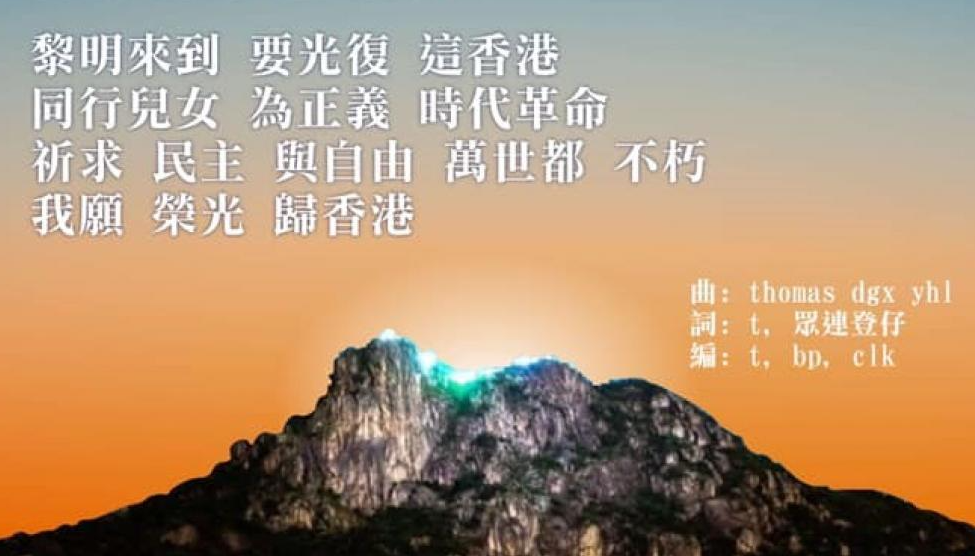
***
Bring Back the Glory of Hong Kong
(An Anthem)
《願榮光歸香港》
‘Jyun6 wing4 gwong1
gwai1 Hoeng1 Gong2’
Tune 曲: thomas, dgx, yhl
Lyrics 詞: t, 眾連登仔
Translated by John Minford
with Geremie R. Barmé
何以 這土地 淚再流
Again, tears flow
For this Land of ours!何以 令眾人 亦憤恨
Again, we gather here,
In righteous fury!昂首 拒默沉 吶喊聲 響透
Hold high your heads, reject silence,
Let the call to arms ring out!盼自由 歸於 這裡
We long for Freedom to return!何以 這恐懼 抹不走
The Terror will never erase us,何以 為信念 從沒退後
In Faith we are firm,
There can be no retreat.何解 血在流 但邁進聲 響透
Again, our blood will be shed!
But ‘Forward!’ our cry rings out!建自由 光輝 香港
Free this Land!
Bring back
The Splendour of Hong Kong!在 晚星 墜落 徬徨 午夜
Though stars may fall, and
Darkness fill the midnight air,迷霧裡 最遠處 吹 來 號 角 聲
Distant clouds will echo still our call to battle.捍自由
We are fighting for Freedom,來齊集這裡
Gathered together here as one,來全力抗對
Determined to resist!勇氣 智慧 也 永不滅
Our Courage and our Wisdom
Will never be destroyed.黎明來到 要光復 這香港
The Light is nigh, the Dawn is at hand!
Bring Back the Glory of Hong Kong!同行兒女 為正義 時代革命
Sons and Daughters,
Let us March together for what is right!
This is the Revolution of Our Times!祈求 民主 與自由 萬世都 不朽
Pray for Democracy,
For Freedom Eternal,我願 榮光 歸香港
For the Glory to come back to Hong Kong!
***

***
The Birth of a ‘Hong Kong Anthem’?
The Composer of ‘Bring Back the Glory of Hong Kong’ — Music is the Most Powerful Means to Encourage Solidarity
An Interview by The Stand News
專訪:「香港之歌」誕生?
《願榮光歸香港》創作人:
音樂是凝聚人心最強武器
Translated and Annotated by Geremie R. Barmé
‘Again, tears flow
For this Land of ours!’
— words that are now heard everywhere
今期流行:「何以,這土地淚再流 … 」
On 10 September, ‘Bring Back the Glory of Hong Kong’ could be heard in districts all over Hong Kong. As the whistle was blown at the start of the match between Hong Kong and the visiting Iranian soccer team at the Hong Kong Stadium at Causeway Bay fans in the stands started singing the song as if it were a national anthem. At halftime, as everyone joined hands to build yet another Human Chain of Protest, they sang it again. When the match was over and people were leaving the stadium they were still singing it. And when the crowds of fans reached the busy shopping district at Causeway Bay nearby they were still singing it.
That night in districts throughout the territory — at Sha Tin, Quarry Bay, Wong Tai Sin, Tuen Mun, Ma On Shan, Mong Kok, Kwai Fong, Tseung Kwan O, Sheung Shui, Kwun Tong — thousands of people responded to an appeal [that had gone out on social media platforms used by protesters] and converged on their local shopping malls. While reading the lyrics of the new song on their phones, they sang; they were singing an anthem in unison. These were powerful and inspiring scenes. Overnight, it seemed as though ‘Bring Back the Glory to Hong Kong’ had indeed become the new ‘Hong Kong anthem’.
9 月 10 日,《願榮光歸香港》一曲響遍全港各區。香港足球代表隊在大球場迎戰伊朗,球證鳴笛開賽,看台上球迷隨即合唱,如唱國歌;中場休息大家築成人鏈,再唱;球賽結束,魚貫散場之時,繼續唱,走到銅鑼灣鬧市,仍在唱。
同一晚,繼沙田、太古後,黃大仙、屯門、馬鞍山、旺角、葵芳、將軍澳、上水、觀塘,都有上千市民響應號召,齊集區內商場,眼望歌詞,一同合唱。埸面極其墟冚。一時之間,《願榮光歸香港》彷彿成為一首「香港之歌」。
***
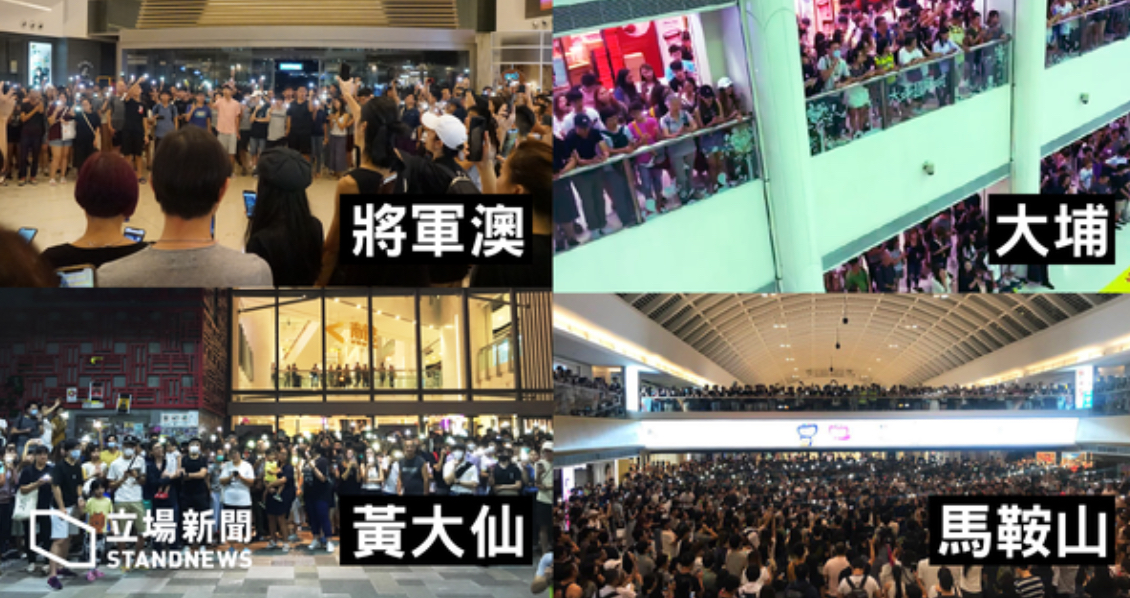
***
Where did this song come from?
‘We Hong Kong people can be brought together by the uplifting energy made possible by songs.’
During his interview with The Stand News, the composer ‘T’ said that he hopes his song — ‘Bring Back the Glory of Hong Kong’ [hereafter referred to as ‘Glory of Hong Kong’] — will have just that kind of power.
這首歌是如何誕生的?
「香港人需要有 power、能凝聚人心的歌。」T 接受《立場新聞》專訪時說,希望《願榮光歸香港》能成為這樣的一首歌。
***
Another Song Like ‘Today It’s Me’?
又「今天我」?
On 31 August, a user named ‘dgx dgx’ uploaded a music video titled ‘Bring Back the Glory of Hong Kong’ on YouTube. There have been many other versions posted since then and, in under two weeks, the song has been viewed and listened to over one million times.
The Stand News made contact with ‘dgx dgx’ via the LIHKG and Telegram platforms. In our interview, he calls himself ‘T’; he’s a professional musician in his early twenties. T told us that he’s in a musical group and that prior to this he had written quite a few other songs, although so far none of them have been released. He prefers to work in pop and rock; ‘Glory’ is the first time he’s written a more traditional, or quasi-classical work.
From the time that the Anti-Extradition Bill Protests took off [in June 2019], and even back during the days of the Umbrella Movement in late 2014, T tells us that he thought Hong Kong really needed a new protest song. He explains himself by saying that, although popular works like ‘Vast Skies and Broad Oceans’ and ‘Glorious Times’ were often sung during earlier protests and, granted, they were moving in their own way, still they didn’t really manage to crystalise the general oppositional tenor of the demonstrations.
‘They’re both popular songs and, though everyone knows them and can relate to them, their melodies aren’t necessarily a good fit with the atmosphere of street protest.’
《願榮光歸香港》在 YouTube 上已有眾多版本,原創 MV 由一個叫 dgx dgx 的用戶於 8 月 31 日上載,至今不足兩星期,點擊率已破百萬。
《立場新聞》透過連登討論區和 Telegram 聯絡上「dgx dgx」,創作人真身叫 T,今年廿多歲,為全職音樂人。他說,自己有隊創作樂隊,以前寫過不少歌,既未曾公開,音樂性質亦多屬 pop rock,像《願榮光》這樣的 classical 作品,是其第一次。
T 形容,早在反送中運動最初階段,甚至是五年前的雨傘運動,已覺得香港需要一首全新的抗爭歌。他舉例,過去社運街頭不時響起的《海闊天空》、《光輝歲月》,不是不動聽,卻總有點格格不入。「兩首都係偏向流行曲,雖然大家都有共鳴,但旋律上唔係好 match 現場的氣氛。」
***
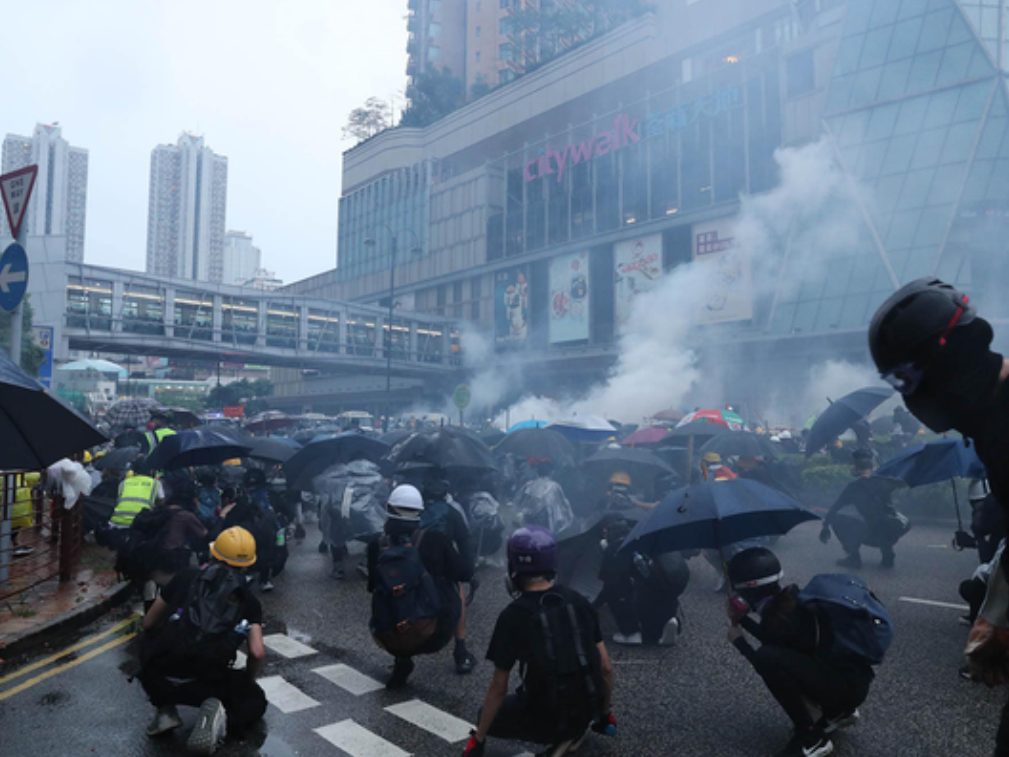
***
But what, exactly does T mean when he says those songs aren’t such a ‘good fit’? He explains that, although songs like ‘Vast Skies’ are striking, they don’t quite go with the strong tempo or resounding kind of repetition that you’d want to hear during a street march; nor do the lyrics have the kinds of rhythm that are ideally suited to protest; moreover, the lyrics don’t have the right kind of beat.
‘When you are really worked up, if the songs you are all singing don’t have the right rhythm it sort of throws you off.’
In T’s opinion, a successful protest song should be one that is more akin to a militant march and classical music is better suited to such a task:
‘You need the right kind of beat.’
Then there’s the fact that many people have the impression that only ‘performative lefties’ like singing rousing militant songs at their protests, and what they doing is little more than an act. But T doesn’t agree. Before he even set to work on ‘Glory of Hong Kong’ he had collected quite a lot of material:
‘Over the centuries there have been many really great martial songs but, in point of fact, in the heat of battle they’re pretty useless; when you’re about to clash with the enemy you simply cannot sing those things. When you’re facing a disastrous situation, however, or when the troops are relaxing and just want to pass the time, there are military tunes that work really well, they really can lift people’s spirits.’
That’s exactly what led him to try his hand at writing a protest song for Hong Kong.
‘Something that would both be inspiring and infectious.’
何謂「唔 match」?T 從旋律角度解釋,《海闊天空》等流行曲有個特色,就是節奏感有少許錯位,即歌詞未必跟著重拍,又或一拍多於一粒字,「情緒激昂的時候,唱錯位的節奏歌係有少少怪的。」他認為,一首理想的抗爭進行曲,旋律應該類似古典音樂,「對正重拍的節奏感先啱。」
又有人覺得,在社運現場唱歌是「左膠」所為,無實質意義,T 不太認同。寫《願榮光》之前,他搜集過不少資料,「自古以來的士兵都有好多軍歌,打緊仗時現場太嘈,梗係唔會唱;但情況好惡劣,又或平時消磨下時間,都會唱下軍歌,激勵士氣。」
因此他嘗試為香港抗爭者創作這首歌,「要可以激勵士氣,感染人心嘅。」
***
When Inspiration Struck,
The Last Line Came First
靈機一觸 由尾句開始
Composing a new work takes time, and T spent two months on the tune of ‘Glory of Hong Kong’ alone.
‘I just sat at the piano with all those protest scenes and news reports running through my mind.’
He tried many different approaches:
‘I set the bar pretty high for myself because I wanted to create a song that was both simple and easy to remember. I had to keep mulling it over and over.’
He didn’t just rely on his imagination, however, and T constantly drew inspiration from the music he was listening to; he has a particular taste for Baroque music and, of course, for military music. He showed The Stand News the list of reference works that he had drawn upon. Apart from the national anthems of Great Britain, the Untied States and Russia, it included ‘Battle Hymn of the Republic’ and ‘Gloria in excelsis Deo’ by Vivaldi.
但創作是需要時間的。
單是《願榮光》的旋律,T 便花逾兩個月時間創作。「喺個琴前面,一路回想起抗爭的片段、新聞,一路彈。」有時他作了一些旋律,又覺得不夠好,於是推倒重來。「我要求比較高,呢首歌的 melody 一定要簡單又易入腦,所以唔達標準的話,就會繼續諗。」
空想也不是辦法。T 又參考過不少音樂作品,例如他很喜歡的巴洛克時期古典音樂,以及一些現代軍歌。他向記者提供一份參考歌單,裡面除了有英、美、俄三國國歌,還有美國的《共和國戰歌》(Battle Hymn of the Republic),以及韋華第(Antonio Vivaldi)的 Gloria in excelsis Deo。
T worked on the project from early June, but it wasn’t until mid August that inspiration finally struck and, when it did, it started at the end, when he struck on the melody that he would use for the last line of the song, ‘Bring Back the Glory’. With that as a start, the rest of the tune pretty much fell into place. Within two days, T had a finished score.
He says that he didn’t feel that Hong Kong people share the emotionalism or aggressiveness that you get with Russians. In us rather, as T observes, ‘there’s a modicum of the dignity you might find among the English’, ‘though without their kind of stiffness’. He wanted to reflect something that was a mix of the two; that’s why ‘Bring Back the Glory of Hong Kong’ opens with considerable solemnity but, then,
‘Later on, the song gives voice to the ideas of Justice, Freedom and Democracy, and as such the tempo shifts to creating a greater mood of uplift.’
From the start, ‘Glory of Hong Kong’ was not going to be a pop tune since the composer favoured something in a more classical style: clear and concise lyrics, the tune that allowed each line to be made out clearly and a regular beat throughout. Many people can remember the tune only having heard it a couple of times, just as it is easy to sing. That’s just as it is supposed to be.
由六月初開始創作,到了八月中,T 靈機一觸,想到了全曲最後一句(「我願榮光歸香港」)的旋律。開了頭,全曲旋律創作就變得比較容易,兩天之內,一氣呵成。
他形容,香港人的民族性,「唔似俄羅斯戰鬥民族咁激昂」,有「少少似英國人的莊嚴」,但又「無佢哋嗰種古板」,更似是兩者混合。因此《願榮光歸香港》開首的旋律較為莊嚴,「後面因為公義、自由、民主去發聲,變得激動啲。」
另一方面,有異於流行曲,《願榮光》更偏向古典音樂,樂句清晰、簡短,旋律分句明確,節拍均衡。不少人聽兩次已記得旋律,甚至很快懂唱,不是沒有原因。
***
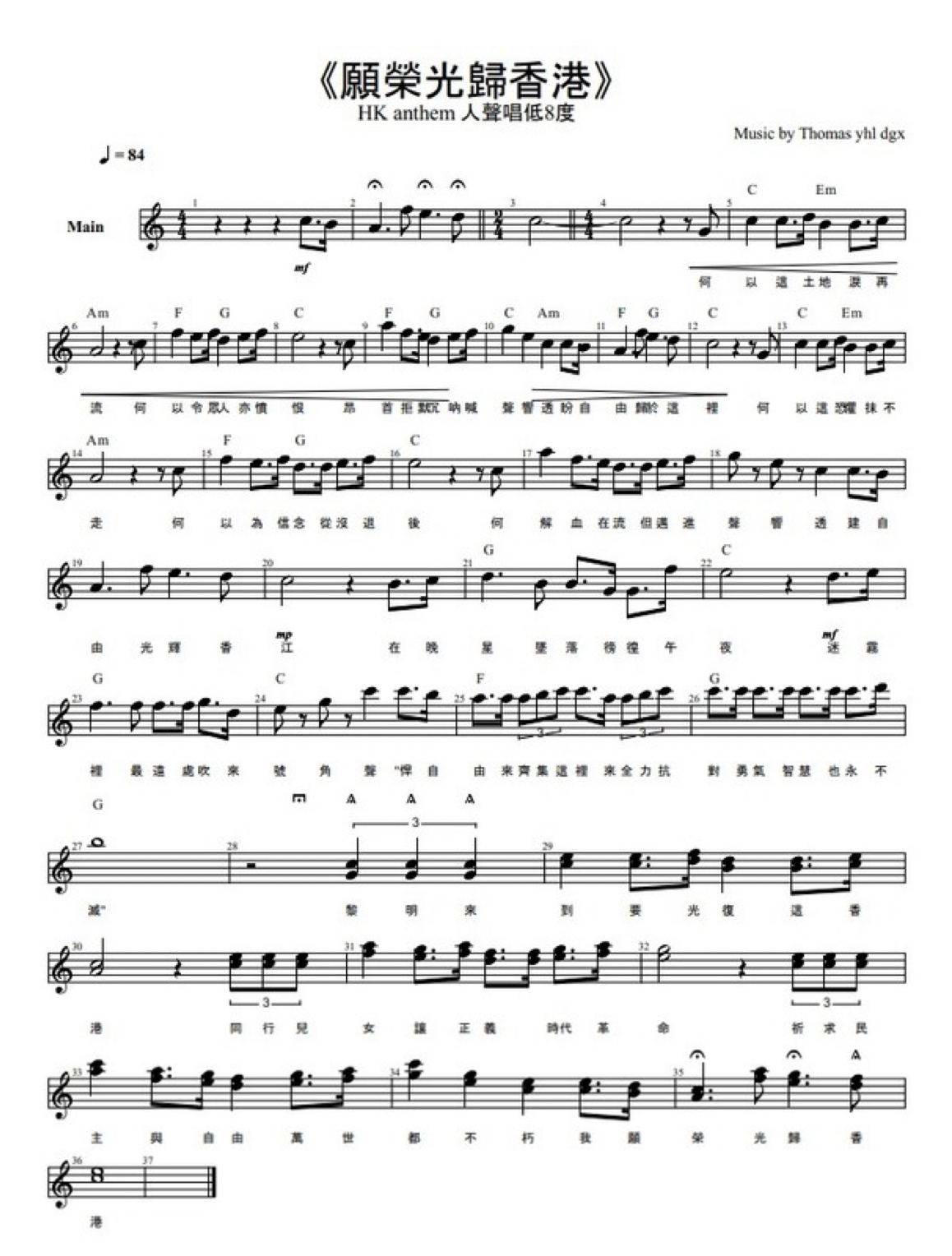
***
‘I Only Hope Kong Will Regain its Splendour’
「希望香港變回光榮城市」
Once he had the melody, it was time for the lyrics. As T told us, he had started with the last line, ‘For the Glory to come back to Hong Kong!’.
‘Too many of the things that have been going on are just not right. Everyone just took it for granted that Hong Kong was a prosperous and stable place, a city with its unique kind of “glory”. But with what has been revealed [before and during the protests] we’re confronted with a far more stark reality…’
And that’s why, as T tells it, ‘Bring Back the Glory’ has a double meaning. On the one hand it is about looking to the future — ‘It’s an expression of the hope that Hong Kong will indeed be the glorious, shimmering city that we all have in our hearts’. On the other hand, it is about the People of Hong Kong themselves, ‘all of us who want to devote their own achievements and worth to their city.’
Some people feel that the word ‘glory’ [榮光 wing4 gwong1] that features in the song has an implicitly religious connotation, but T responds with a laugh saying that he’s not religious at all. He tells us that although ‘glory’ is indeed a common word in the Christian lexicon, it also features prominently in Chinese literature, such as in ‘Rhapsody on the Hunt’ by the Tang-dynasty poet Li Bo, which uses the term in the line ‘The glory extends to all who come after us… ’. It also occurs in a well-known quotation from the twentieth-century writer Lu Xun who, in his series ‘Random Thoughts’, wrote:
‘They can bask in the reflected glory of their positive national traditions.’
When we asked T how he composed the rest of the lyrics, he offered an explanation of each stanza:
「他們的國粹,既然這樣有榮光,他們自然也有榮光了!」
有了旋律,就寫歌詞。T 最先想好的,當然又是全曲最後一句,「我願榮光歸香港」。
「現在太多不公義的情況。大家以為香港是個繁榮安定、好光榮的城市。但原來一直揭露下去,原來唔係嘅 … 」
所以「我願榮光歸香港」有兩層意思,第一是展望未來,「希望香港可變返一個大家心目中的光榮、榮耀的城市」,第二是指香港人「願意將個人的榮耀和光榮歸予香港」。
有些人看到歌名中的「榮光」二字,以為歌曲有宗教意味,T 笑言自己不是教徒,而「榮光」既是基督教常用詞彙,其實也曾出自李白(「方將延榮光於後昆,軼玄風於邃古。」《大獵賦》)、魯迅(「他們的國粹,既然這樣有榮光,他們自然也有榮光了!」 《熱風 · 隨感錄三十八》),共通點是都有「光榮」、「光采」之意。
其他歌詞是如何寫成的?T 逐段向記者耐心解釋。
Freedom, Equality and Justice are natural rights enjoyed by all but, as T notes, in recent years the People of Hong Kong have come to realise that ‘these rights are gradually being stripped away from us’.
‘So that’s how I conceived of the first stanza, with the aim of eliciting fellow feeling among all those who sing and hear the song’.
自由、平等、公正,都是人與生俱來的權利,但近年香港人卻發現,這些價值「原來會不斷被剝奪、打壓」,「這是歌詞第一段想講的,令大家有返共鳴。」
The First Stanza reads:
何以 這土地 淚再流
Again, tears flow
For this Land of ours!何以 令眾人 亦憤恨
Again, we gather here,
In righteous fury!昂首 拒默沉 吶喊聲 響透
Hold high your heads, reject silence,
Let the call to arms ring out!盼自由 歸於 這裡
We long for freedom to return!
The second stanza addresses the Anti-Extradition Bill Protest Movement.
‘Faced with the injustice of the situation everyone is ready to take a stand even if that means that blood may be shed or lives sacrificed.’
第二段歌詞,形容的則是反送中運動的概況,「大家見到不公義的情況,即使流血,甚至有人獻出生命,大家都要企出來。」
The Second Stanza:
何以 這恐懼 抹不走
The Terror will never erase us,何以 為信念 從沒退後
In faith we are firm,
There can be no retreat.何解 血在流 但邁進聲 響透
Again, our blood will be shed!
But ‘Forward!’ our cry rings out!建自由 光輝 香港
Free this Land!
Bring back the Splendour of Hong Kong!
The third stanza is different again as its theme is that ‘even in the pitch dark of night, we must all continue our forward march’.
The Third Stanza:
第三段歌詞跟其他特別不同,主題是「黑暗時期大家都要繼續前進」。
在 晚星 墜落 徬徨 午夜
Though stars may fall, and
Darkness fill the midnight air,迷霧裡 最遠處 吹 來 號 角 聲
Distant clouds will echo still our call to battle.捍自由
We are fighting for freedom,來齊集這裡
Gathered together here as one,來全力抗對
Determined to resist!勇氣 智慧 也 永不滅
Our courage and our wisdom
Will never be destroyed.
The fourth and final stanza appeals to a brighter future, one in which Glory returns to Hong Kong.
最後一段則是展望未來,「希望光明、榮耀重臨香港」。
The Fourth Stanza:
黎明來到 要光復 這香港
The light is nigh, the Dawn is at hand!
Bring Back the Glory of Hong Kong!同行兒女 為正義 時代革命
Sons and daughters,
Let us March together for what is right!
This is the Revolution of Our Times!祈求 民主 與自由 萬世都 不朽
Pray for Democracy,
For Freedom Eternal,我願 榮光 歸香港
For the Glory to come back to Hong Kong!
T admits that when composing the song he placed more importance on writing the lyrics than coming up with a perfect rhyme, so when parsing some of the lines they read rather awkwardly.
‘Since I couldn’t find anything more suitable at the time, this is what I ended up writing,’ he tells us.
He hopes if others have suggestions about how to improve it, he’s happy to revise it as time goes on. After all, he says:
‘Lots of songs like this have been reworked numerous times.’
T 承認,《願榮光歸香港》歌詞以意義行先,因此有些歌詞不押韻,「都無辦法,暫時未搵到更好的代替。」他期望如別人有更好的提議,之後可繼續修正,「好多呢方面的歌,啲詞都係改過好多次。」
***
In a Recording Studio,
Without Face Masks
除下口罩 錄音室相見
He could only go so far with the composition by himself and, once he had a working draft, T decided that it was time to share it with others so they could help him improve on it. So, at midday on 26 August, he posted a message on LIHKG that simply read:
‘I’ve written a martial ballad in the hope of lifting everyone’s spirits. I’ve called it “Bring Back the Glory of Hong Kong” and I’d like to put together a virtual choral group to sing it.’
He included his draft using MIDI [which allows free downloads of music] with the proviso that it was still in pretty bad shape. He included in his post an appeal to fellow LIHKG users for improvements and he even asked them to post their own sung versions of the lyrics so that he could put together a draft recording.
The response was pretty enthusiastic and quite a few online ‘Brothers’ and ‘Sisters’ [that is, fellow protesters] helped T spread the word. They also suggested various improvements to the lyrics:
‘People said that the song should definitely feature the key slogan of the protests, [that is, Edward Leung’s call to]: “Restore Hong Kong, the Revolution of Our Times”, but they didn’t know where it should go.’
A sound engineer got in touch to say that could help with recording and mixing the song. The responses were beyond anything T had expected:
‘Originally, I hadn’t thought it would be taken so seriously. I’d only posted it to check out what responses I might get; I sure didn’t think there’d be such a reaction. Especially when you start talking about “mixing”; that’s like very full on.’
Then he adds, that he did think there would be an enthusiastic response among fellow LIHKG users:
‘I thought the tune was pretty much on the money, so I was confident that people would like it.’
閉門造車也不是好方法,寫好歌詞初版,T 就打算找其他人幫手,集思廣益。
8 月 26 日中午,他在連登開了個 post,題為「作左首軍歌幫大家回血《願榮光歸香港》 招virtual合唱」,上載歌曲初版,「好 midi,好難聽的版本」,呼籲「連登仔」就歌詞提出建議,以及自行唱歌錄音上載,以助製作合唱版。
反應頗為熱烈,既有不少巴打、絲打「幫推」,提議怎樣改善歌詞,「本身歌詞無最重要的口號,『光復香港,時代革命』,有人諗到點放落去,我無諗過可放嗰個位。」還有 sound engineer 表示可幫忙錄音及混音。這可超出 T 的預期:「本身諗住唔係咁 serious,只係諗住放上去睇吓反應點,無諗過要整咁多嘢,因為 mixing 要好大製作先要。」不過他補充,早預到「連登仔」反應會熱烈。「覺得首歌旋律幾正,都有自信大家會鍾意。」
***
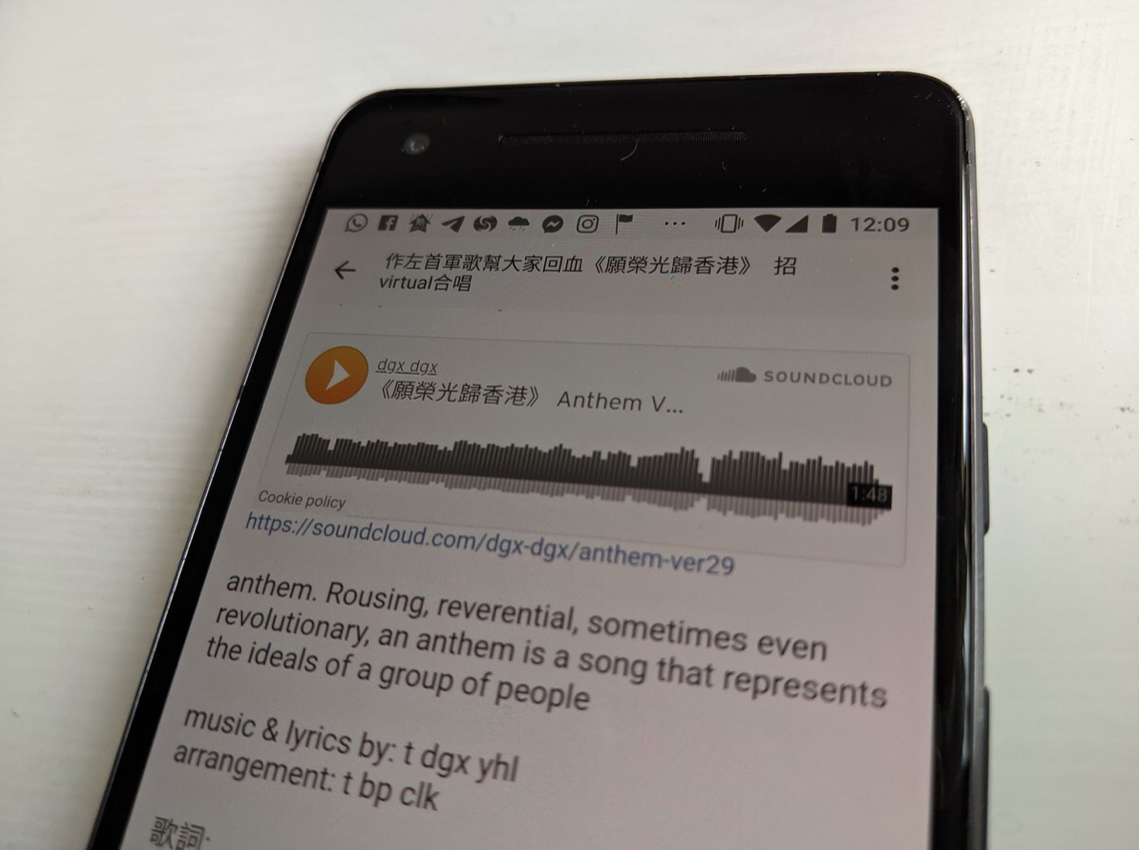
***
Within a few days over twenty young people who had responded on LIHKG came to a recording studio, though since everyone’s availability depended on when they got off work, most could only record a track when they were free. After that, they did a choral recording in groups of four or five. It took many sessions to get it all down, ‘That’s because it was hard to get the right oomph,’ explained T. ‘It had to be dubbed over time and again until I felt we had the right kind of powerful timbre.’
T was deeply moved by the singers, men and women who took off their face masks to gather together for the project:
‘You really could tell that people were committed to this. When they came into the studio they had the same solemn look in their eyes. Of course, none of us had ever met before so there was also a certain amount of awkwardness. But when we were all gathered together everyone did their very best to give it everything they had and to contribute to a powerful rendition.’
‘They were not there for me; they were there for this song. It’s something that is about all of us. They shared a sense that this song really could spur on the movement as a whole; it could help bring people together and encourage everyone to get out and sing, too.’
於是兩、三日後,廿多個連登巴絲響應呼籲,到錄音室進行合唱團錄音。由於大家放工時間都不一樣,最初他們逐個進行錄音,後來人齊了就四五個一組地錄,錄了好多次,「因為氣勢唔夠,要 dup 多幾次,整厚啲個聲。」
T 對這班脫下口罩合唱的連登仔女印象深刻。「睇得出大家都係好 serious 的態度。行入 studio 的時候,眼神好堅定,大家唔識大家,有少少怕醜,但落到場要唱時,大家聲線都盡量變到好雄壯嗰隻。」
「佢哋唔係為我,為首作品,而係為咗大家,因為覺得呢首歌可以鼓勵到成個運動,凝聚到人心,佢哋先會出來唱。」
***
Music: a Weapon in the Arsenal
音樂作為武器
Needless to say, T is a participant in the protest movement himself. He says that he’s a ‘little more out there’ than the general Peaceful-Rational Protesters [who don’t engage in direct action or overt violence], although he’s not up there on the front line of the Brave-Militants either.
According to his way of thinking, the people of Hong Kong are engaged in a protracted war that’s about defending Conscience, Freedom and Justice.
‘The battlefield is not just out on the streets, nor is it just about the withdrawal or otherwise of a particular piece of legislation. The battlefield is in our minds; it’s on the field of morality. To participate in it, there’s a large number of people in Hong Kong who are not putting their own self-interest first; they have realised that there really are things that are more important than money; things that are even more important than life itself.’
T 當然是反送中運動的抗爭者之一。他說,自己比和理非「行前少少」,但又不是前線的勇武派。
他形容現在香港人正在打的,是一場捍衛人民良知自由公義的持久戰,「戰場唔單止喺街頭,唔再係立法會入面一條條例撒唔撒,而係思想上、道德價值上,有一大班香港人唔再係利益行先,發現有啲嘢比金錢重要,甚至比性命更重要。」
T only gradually came to the realisation that, as a musician, he could do more than just demonstrate in the streets:
‘Music is a powerful tool. Do you know how strictly the Soviets controlled and policed music? They did so because they were aware of just how potent music could be; they knew that it could easily be used to incite people. Music is far more inspiring than any kind of writing, than all your slogans and posters.’
Protesters use wooden shields and umbrellas to protect themselves, and they employ bricks, stones and Molotov cocktails as weapons. Music is also a crucially important weapon, it’s one that T is contributing to the movement.
The music video of the choral version of ‘Bring Back the Glory of Hong Kong’ was released online on 31 August. It took off within a few days. Initially it was sung by groups of protesters during the demonstration near the American Consulate [originating at Charter Garden the demonstration was organised to support the ‘Hong Kong Human Rights and Democracy Act’ being considered by Congress in Washington]. Then it began to ‘blossom’ throughout Hong Kong [like the Lennon Walls previously], at Hong Kong Stadium and then at shopping malls throughout the territory.
T has also joined groups that have been singing his song. He says it’s a deeply affecting experience:
‘People of all ages — uncles and aunties included, holding pieces of paper with the lyrics written out; they put everything they have into singing it, even if they’re not always in tune… We all have this song now; it brings us together in a new kind of unity. I feel that I’ve achieved what I set out to do.’
He laughs, though, since, as the creator of the song he’s generally anxious about his creation:
‘What I worry about is the quality of the singing, the fact that people don’t really get the beat and don’t sing it all that well. … As an artist, I’d like everyone to do it a bit better.’
What does he expect?
‘More overt enthusiasm; and a better beat. Most people aren’t used to short tones, which the song has lots of. So they drag the phrases out far too long and that spoils the rhythm.’
T 則慢慢發現,除了在街頭抗爭,作為音樂人,他可以做得更多。「音樂係一樣好重要的工具,好似前蘇聯,佢哋係控制音樂控制得好嚴謹,因為佢知道音樂好容易鼓動到人心,比起文字、口號、圖片,更有感染力。」
前線抗爭者手執木板、雨傘為防具,用磚頭、石塊、汽油彈為武器;音樂,則是 T 為這場運動貢獻的最重要武器。
8 月 31 日,《願榮光歸香港》合唱版 MV 正式見街;幾日後,歌曲突然爆紅,先有美國領事館一帶花園道的遊行隊伍合唱,然後遍地開花到香港大球場,以至全港各大商場。
T 試過在現場跟其他人一起唱自己的作品。他說,那個場面既令他感動,「好多唔同年齡的人,阿叔、嬸嬸,都拎住歌紙,好努力地唱,即使拍子唔係好準 … 大家都有首歌可以團結人心,呢個目標係達到嘅。」然而作為創作人,他笑言,自己大部分時間其實在擔心,「喺度驚大家甩 beat、唱得唔夠好 … 從藝術家的角度,梗係想大家唱好啲。」
怎樣唱得好一點?「要雄壯啲,同埋個節奏感差少少;短音那些位,大家可能未唱慣呢種 style,成日會將啲音拖長咗,節奏感少咗。」
***
I’m guessing that everyone feels that this song is having a great impact on our sense of collective unity and local identity. I feel that the song has already captivated our hearts and more and more people are listening to it and learning to sing it.
That’s why I’m wondering whether perhaps the citywide ’10:00pm Nightly Slogan Chanting’ shouldn’t now become a time when everyone raises their voices to sing this song? I think this would contribute to the sense of unity among Hong Kong people and further inspire our determination to struggle on.
今日(10/9)喺葵芳、黃大仙、將軍澳、大埔同觀塘都有人聚集唱《願榮光歸香港》,大球場亦都有民眾自發唱歌,相信大家都睇到好激動同振奮。
我諗大家都同意依首歌絕對對增強我哋凝聚力同歸屬感有莫大嘅幫助,而且依首歌已經深入民心,開始多咗好多人聽/識唱。
咁有無可能將每日十點鳩叫活動進化成每日十點商場高歌活動?令到我哋香港人更加團結,士氣更加高漲。
— a post from LIHKG
***
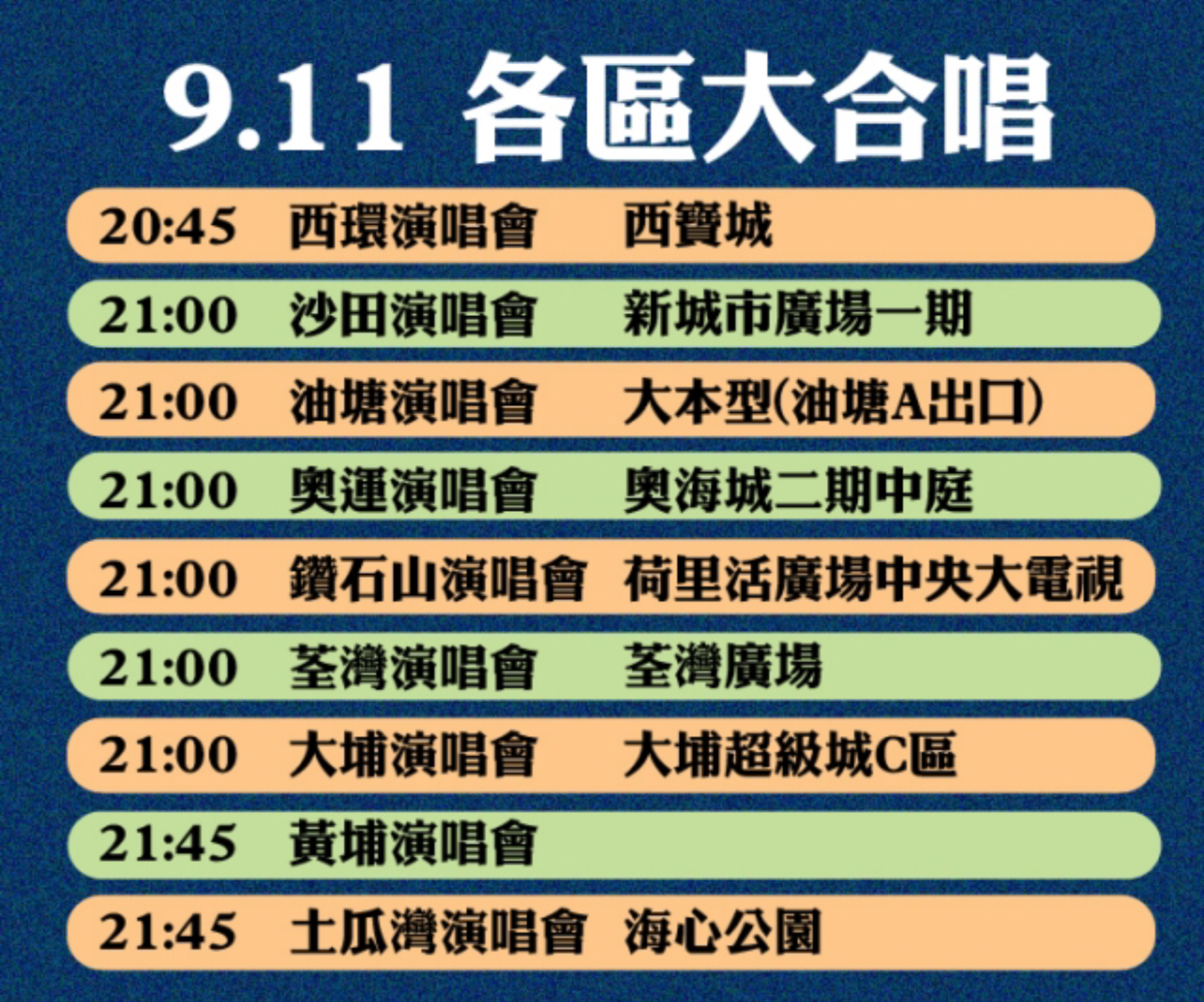
***
When a Song Becomes an ‘Anthem’
當作品成為「香港之歌」
T also wants to remind everyone that they shouldn’t overdo it:
‘You don’t want to sing “Bring Back the Glory of Hong Kong” into the ground; not everyone is necessarily going to be into it. You need to respect the right of other people to not like it, or to grow tired of it. It shouldn’t be broadcast constantly or shoved down people’s throats 24/7. I think it should be sung on specific occasions or for particular reasons, otherwise it shouldn’t be sung.’
The reality is that people are organising spontaneous mass choral renditions of the song in districts all over Hong Kong. ‘Glory of Hong Kong’ is definitely set to become a song that everyone in this city knows. A number of people have already made it the ringtone on their mobile phones, or on their alarms at home. It’s as if it’s reminding people that: ‘When I wake up every morning, I wake up not to an alarm, but to the sound of hope.’
It’s pretty obvious that for many people ‘Glory’ is not just a protest ballad; it has become the ‘Anthem of Hong Kong’, if not ‘The National Anthem of Hong Kong’. But T is keeping his cards close to his chest:
‘That’s just people on LIHKG getting carried away and indulging in exaggeration. They like the sound of it so they talk it up as a “national anthem”. Of course, it’s an exaggeration that helps get the message out there, but let’s be realistic:Hong Kong is just a Special Administrative Region, not a nation. How can it have a “national anthem”?’
He reminds us all that:
‘I’m just happy for it to be a protest ballad. But if people think it should be the song of a particular district or a “national anthem” then something like that has to be widely discussed and subject to democratic deliberation. No individual or small group of people can just go ahead and make a claim like that.’
另外 T 又想善意提醒大家,不用過份吹奏《願榮光》:「大家唔駛狂 loop 一首歌,因為唔係個個人都鍾意,大家都要尊重佢地的權利,唔駛 24 小時狂播轟炸,都俾佢哋選擇下想唱的歌,或者唔唱。」
但觀乎事態發展,隨著各區街坊繼續自發舉行大合唱活動,《願榮光》似乎會變得愈來愈家傳戶曉。不少人將此曲設定為電話鈴聲,甚至是鬧鐘的音樂,聲言「每朝叫醒我嘅,唔係鬧鐘,係希望啊!」顯然在許多人心目中,《願榮光》已不僅是抗爭進行曲,更是「香港之歌」,甚至是香港「國歌」。
對此 T 不置可否。「呢個係連登仔不嬲的誇張手法,好聽就話係國歌,呢個誇張手法係有利宣傳的,但講返現實層面,香港只係一個特區,唔係國家,何來國歌呢?」他又提醒,「我原意是抗爭的進行曲啫,但如果你要將佢變做區歌、國歌,應該係民主討論的結果。唔係話,我自己或一小班人話係就係。」
In mid July, when the slogan ‘Restore Hong Kong, the Revolution of Our Times’ became the quasi official slogan of the Protest Movement, it was something that instantly touched a raw nerve both within the government and among the city’s pro-Beijing politicians. Even Carrie Lam-Cheng Ngor-yuet [who has often been MIA during the monthslong protests] managed to make a public statement in which she declared that the slogan was nothing less than a ‘provocation directed at the One Country Two Systems arrangement [with Beijing] and national sovereignty’. Given the present state of affairs, one in which ‘Glory of Hong Kong’ has been taken up by so many people so quickly and has even been elevated to the status of ‘The Hong Kong Anthem’, it is highly likely that the authorities will soon turn their attention to it as well. T says:
‘It’s the kind of dilemma artistic works confront all the time. Everyone’s going to see what they want to no matter what the work is — be it a piece of art or a song. There’s no way I can tell anybody what they are allowed to think. People will interpret the song however they wish; it’s something beyond my control.’
Of course, T is hardly a naïve innocent and he’s mindful of the fact that he could suffer repercussions for writing the song, or that the authorities might eventually exact some kind of revenge on him:
‘Best not to get tied up in knots about all of that, right?’
七月中,當「光復香港,時代革命」成為反送中運動最廣傳的口號,馬上挑動政府、建制派的神經,就連特首林鄭月娥也曾公開指口號「挑戰一國兩制和國家主權」。如此看來,隨著《願榮光》進入大眾視線,以至獲高舉為「香港之歌」,它可能很快也會被政權盯上。
「呢個就係所有藝術都會面臨的困難,每個人睇一件藝術品、聽一首歌,都有佢各自的理解,無理由話你唔可以諗其他嘢,是聽眾個人理解,我控制唔到。」
當然 T 也不天真。他不是沒想過會被人秋後算帳,「但唔驚得咁多啦,係咪?」
***
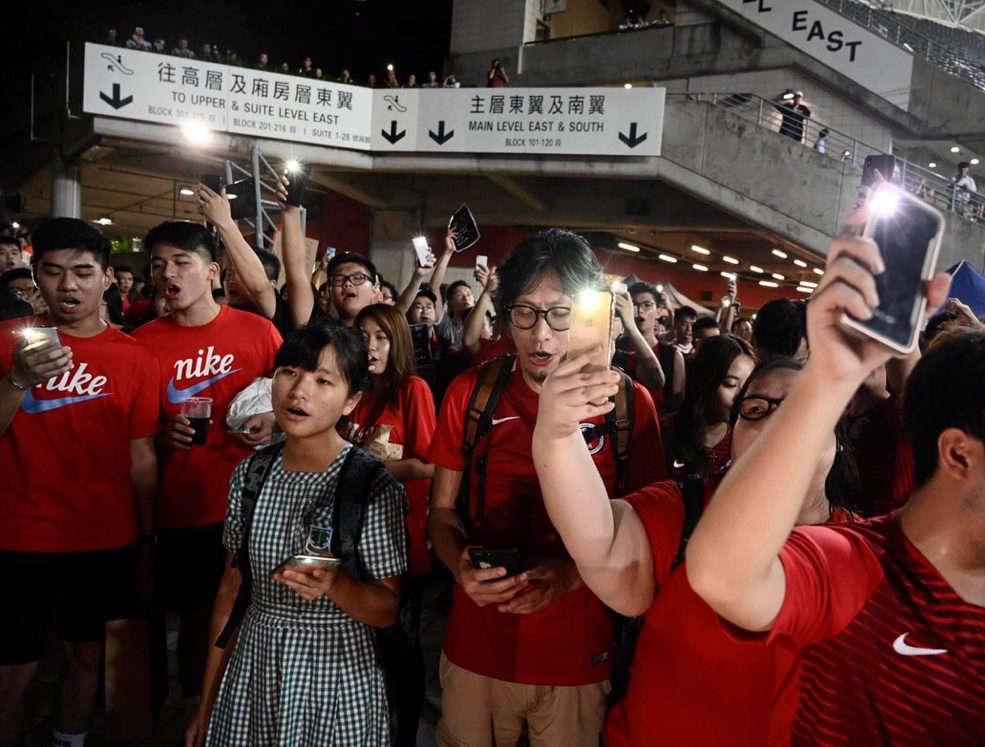
***
Source:
- The Stand News, ‘專訪「香港之歌」誕生? 《願榮光歸香港》創作人:音樂是凝聚人心最強武器’, 《立場新聞》, 2019年9月11日
Some Advice to My Fellow Protesters
Dear Everyone:
This might be completely the wrong time to say this, but can I beseech you all to remember that, just as we are now enthusiastically singing ‘Bring Back the Glory of Hong Kong’, you really should be aware that there’s no real difference to how we were all inspired by singing ‘Today It’s Me’ back in 2014
各位
雖然而家咁問會好唔啱聽
但真係請各位諗下
我地而家唱願榮光歸香港
同2014年既時候唱今天我
有乜野分別Now, I’m not saying that it’s meaningless to be singing ‘Bring Back the Glory of Hong Kong’, it’s just that I would point out that when we sang ‘Today It is Me’ we were so uplifted and excited by ourselves; just as we are uplifted and excited about how we feel today, as we sing ‘Glory of Hong Kong’. But that’s no reason to feel any sense of satisfaction or to slacken off in any way
我唔係話唱願榮光歸香港冇用
我想講既係
當年唱今天我,好激昂好澎湃
而家唱願榮光歸香港都好激昂好澎湃
但唔可以因為咁而覺得自滿而停滯It’s not just about singing a song. We must remember that we need to focus international attention on our plight, on Hong Kong. We must persevere in our efforts to uncover evidence of the police-triad conspiracy on 21 July and 31 August. We must continue to devise ways to keep up pressure on the government and force them to respond to the Five Great Demands
唔好剩係掛住唱歌
我地要諗下
請國際注意香港,挖721 831同警暴既證據
仲有乜野方法可以繼續向政府施加壓力
迫使佢地回應五大訴求
A resistance movement or revolution can easily last for a decade or more. Be it a revolution to vouchsafe a city; acts of everyday resistance; the gradually wearing down the forces of evil; overthrowing the corrupt…. all of these require that we engage in:
抗爭/革命搞十年八載唔出奇
衛城革命,生活抗爭;拖垮邪惡、打倒腐敗;
Daily Tasks:
- Support small shops run by people of conscience
- Reject those businesses that support Evil Ones and The Vile, such as any business that advertises on CCTVB; the shops run in the CCP-MTR malls; shops with connections to the Triads or where workers are mistreated; cut back using online shopping services like Taobao and reduce your reliance on your Octopus Card
- When conditions permit ride on the MTR without paying; if two of you are travelling make sure you only pay for one; buy the cheapest tickets; or seniors tickets only
- Raise a ruckus at 10:00pm every night [to remind people of our protests]! (There’s no consensus yet about changing it to 9:00pm)
- Go to the gym, keep in shape. The longer you live, the longer you can continue the fight
- Publish a post online every day; engage in the battle via social media (Twitter, IG, Facebook, Reddit), use the hashtags: #HongKongProtest #Chinazi
#FreeHongKong #HongKongProtests
Twitter channel: https://t.me/twittermansyunzou/ Telegram - Don’t just say you’ll promote this, copy and paste it
- Maintain your ability to think for yourself; improve your analytic abilities; reject fake news and rumours, don’t believe posts put up by Fifty-cent [Communist lackeys]
每日任務:
1. 幫襯良心小店
2. 抵制「邪惡」「無良」的商戶,例如cctvb廣告、黨鐵商埸、黑社會、打壓員工的店鋪,減少淘寶、減少八達通
3. 安全之下,免費港鐵;二人同遊,一人免費;買平飛;長者八達通
4. 夜晚十點咆哮!(改九點未有共識)
5. 健身+運動,身體健康,鬥長命
6. 每日一post,社交媒體戰(Twitter, IG, Facebook, Reddit) #HongKongProtest #Chinazi
#FreeHongKong #HongKongProtests
Twitter 共識頻道 https://t.me/twittermansyunzou
7. 不要說推,試著copy and paste呢段嘢
8. 保持獨立思考,分析能力level up,抵抗fake news/ rumour ,五毛分化post
Weekly Tasks:
- Cut back your spending and built up your savings; say goodbye to Buy Day
- Help save Hong Kong by being filial: show your care and concern for your parents and the elderly; take care of your mother [as you want to take care of Mother Hong Kong]
- Put up three Post-it notes on Lennon Walls and use such techniques to ‘export the revolution’
每星期任務:
1. 低消費,高儲蓄;罷買Bye Buy Day:星期日、星期五(唔買非必需品)
2. 做孝子救港,關心下老母老豆老人家,自己老母自己救
3. 去連儂牆貼3張文宣,輸出革命思想
Monthly Tasks:
- Buy US$; purchase US shares; purchase US shares in your MPF [Mandatory Provident Fund 強制性公積金]
- Find another person to join in
- Show concern for what is going on in the society; act as a juror; distribute leaflets; help organise film screenings [for the resistance]
- Even if I fail to manage all of this, I’ll be sure to focus on continuing on until the end. I’ll make my best effort, will you?
每月任務:
1. 出糧換美金、買美股,MPF都買美股
2. 搵多一個人參與
3. 關心社會,陪審員、派傳單、放映會
或者做唔足,但我會堅持到尾;Best effort,你呢?
— trans. G.R. Barmé

